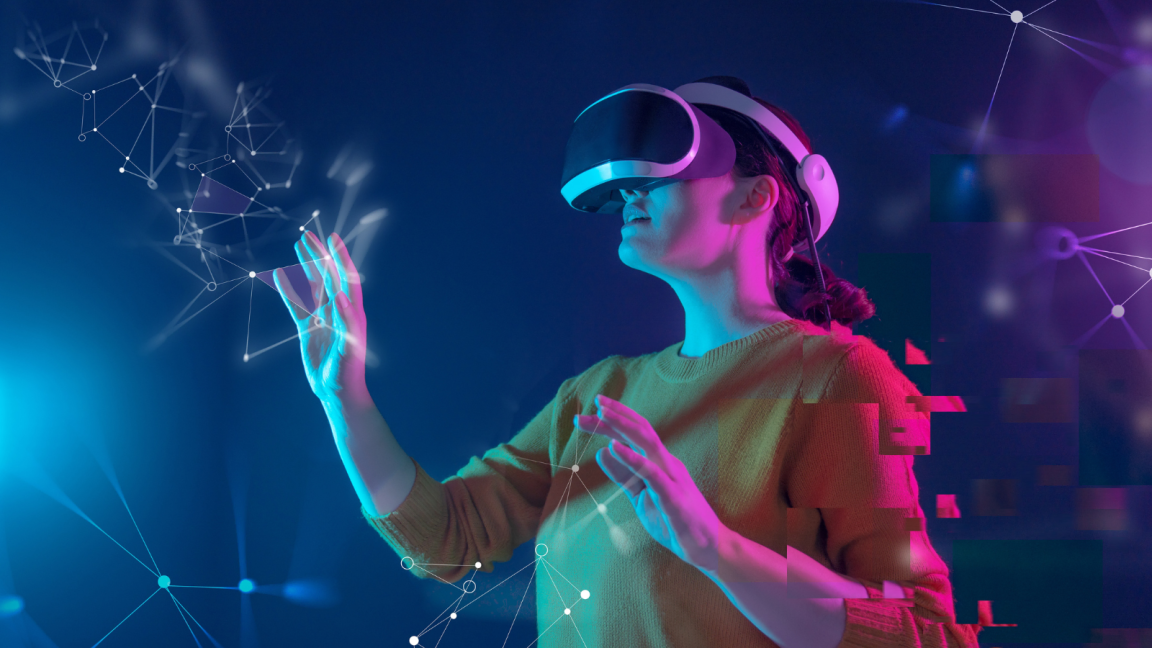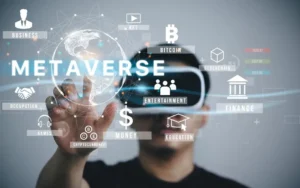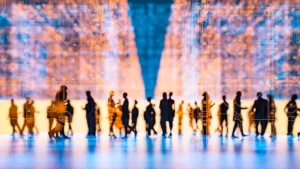The metaverse is no longer just a buzzword from sci-fi novels or tech conferences—it’s a transformative force reshaping how we work, shop, learn, and connect. Imagine a digital universe where you can attend a concert in a virtual stadium, buy a virtual plot of land, or collaborate with colleagues across the globe in a 3D office, all without leaving your couch. This isn’t a distant dream; it’s happening now, and its economic implications are staggering. From creating new job markets to revolutionizing retail, the metaverse is poised to add trillions to the global economy. But what does this mean for businesses, workers, and consumers like you and me? Let’s dive into the metaverse’s economic impact, exploring its opportunities, challenges, and what it means for the future.
What Is the Metaverse, and Why Does It Matter?
The metaverse is a network of interconnected virtual worlds where users interact through avatars using technologies like virtual reality (VR), augmented reality (AR), and blockchain. It’s a digital ecosystem that blends physical and virtual experiences, offering immersive environments for socializing, working, and commerce. Its economic significance lies in its potential to disrupt traditional industries and create entirely new ones.
A Brief History of the Metaverse
The term “metaverse” was coined in Neal Stephenson’s 1992 novel Snow Crash, but its roots trace back to early virtual worlds like Second Life. Today, companies like Meta, Microsoft, and Epic Games are pouring billions into building metaverse platforms, fueled by advancements in VR, AR, and 5G. This convergence of technology is driving economic shifts that rival the rise of the internet itself.
Why the Hype?
The metaverse isn’t just a tech fad—it’s a paradigm shift. Governments, from Seoul to Dubai, are investing heavily, with projections estimating the metaverse could contribute $3 trillion to global GDP by 2031 if adoption mirrors mobile technology. Its ability to bridge physical and digital economies makes it a game-changer for businesses and consumers alike.
Economic Opportunities in the Metaverse
The metaverse is unlocking new revenue streams, job opportunities, and markets. Let’s break down how it’s transforming the economy across key sectors.
Job Creation and New Skill Sets
The metaverse is birthing entirely new professions—think virtual architects, avatar stylists, and blockchain developers. A friend of mine, a graphic designer, recently pivoted to designing 3D assets for virtual worlds, doubling her income in six months. The demand for skills in 3D modeling, VR programming, and digital marketing is skyrocketing.
- Virtual Real Estate Agents: Selling digital plots in platforms like Decentraland.
- Event Planners: Organizing concerts or conferences in virtual spaces.
- Digital Fashion Designers: Creating outfits for avatars, with brands like Gucci already on board.
Retail and E-Commerce Transformation
Augmented reality is changing how we shop. Imagine trying on a pair of sneakers in AR before buying them or browsing a virtual store where your avatar interacts with products. Studies show AR in retail can boost sales by up to 40%. Brands like Nike are already selling virtual sneakers as NFTs, creating new revenue streams.
Case Study: Nike’s Virtual Sneaker Boom
In 2022, Nike launched its Nikeland metaverse on Roblox, attracting millions of visitors. By selling virtual sneakers as NFTs, Nike tapped into a market of younger consumers eager to own digital collectibles. This move not only boosted brand engagement but also added millions to its bottom line.
Education and Workforce Development
The metaverse is revolutionizing education by offering immersive learning experiences. Medical students can practice surgeries in VR, while remote workers attend training sessions in virtual offices. Deloitte estimates the metaverse could add $0.8–$1.4 trillion to Asia Pacific’s GDP by 2035, partly through enhanced training programs.
Real-World Example: VR Training in Manufacturing
A manufacturing firm I consulted for implemented VR training for factory workers, reducing onboarding time by 30%. Employees practiced on virtual machinery, saving costs on physical equipment and minimizing risks. This is just one example of how the metaverse is streamlining workforce development.
Healthcare Innovations
From virtual therapy sessions to AR-assisted surgeries, the metaverse is transforming healthcare. Patients can access mental health support in immersive environments, while surgeons use AR to visualize complex procedures. The economic impact? Potentially $20–$38 billion in additional GDP for Saudi Arabia alone by 2035.
Challenges and Risks to the Metaverse Economy
While the opportunities are vast, the metaverse isn’t without hurdles. Let’s explore the challenges that could slow its economic impact.
High Costs and Accessibility
Building the metaverse requires massive investment—Meta alone has spent over $45 billion, with significant layoffs in 2022–2023 due to overinvestment. VR headsets and high-speed internet remain expensive, limiting access for lower-income consumers. This digital divide could hinder widespread adoption.
The Accessibility Gap
I remember chatting with a small business owner who wanted to join the metaverse but couldn’t afford the hardware or developers needed to create a virtual storefront. Until costs drop, the metaverse risks being an elite playground rather than a global economy.
Privacy and Security Concerns
The metaverse collects vast amounts of user data, raising privacy concerns. Researchers highlight trust as a critical factor in user adoption, with issues like data breaches and unauthorized tracking posing risks. Regulatory frameworks, like the EU’s MiCA, are still evolving to address these challenges.
Regulatory and Ethical Issues
Governments are grappling with how to regulate virtual economies. Questions about digital ownership, intellectual property, and taxation remain unresolved. For instance, should virtual land sales be taxed like physical real estate? These uncertainties could stifle innovation if not addressed.
Comparing the Metaverse to Traditional Economies
To understand the metaverse’s economic potential, let’s compare it to traditional economies using key metrics.
| Aspect | Traditional Economy | Metaverse Economy |
|---|---|---|
| Market Access | Limited by geography and infrastructure | Global, accessible via internet |
| Cost of Entry | High (physical stores, offices) | Lower (virtual storefronts, minimal overhead) |
| Scalability | Constrained by physical resources | Highly scalable with digital infrastructure |
| Job Types | Traditional roles (e.g., retail, manufacturing) | New roles (e.g., virtual architects, NFT creators) |
| Consumer Engagement | Limited to physical or online interactions | Immersive, interactive experiences |
Pros and Cons of the Metaverse Economy
Pros:
- Opens new markets and revenue streams.
- Enhances consumer engagement through immersive experiences.
- Reduces physical infrastructure costs for businesses.
- Creates diverse job opportunities in emerging fields.
Cons:
- High initial investment in technology and skills.
- Privacy and security risks for users.
- Regulatory uncertainty could deter investment.
- Accessibility issues may exclude lower-income groups.
SEO and SERP Analysis: How the Metaverse Impacts Digital Marketing
The metaverse is reshaping search engine optimization (SEO) and search engine results pages (SERPs). As virtual worlds become search environments, businesses must adapt to stay visible.
Optimizing for Metaverse Search
Traditional SEO focuses on keywords and backlinks, but metaverse SEO involves optimizing 3D environments and avatars. For example, a virtual store in Decentraland needs to be discoverable through in-world search algorithms. This requires new skills like 3D content optimization and spatial keyword mapping.
Practical Tips for Metaverse SEO
- Use Descriptive Metadata: Tag virtual assets with relevant keywords.
- Leverage AR/VR Content: Create immersive product demos to boost engagement.
- Build In-World Links: Partner with other virtual businesses to increase visibility.
SERP Evolution in the Metaverse
Search engines are adapting to include metaverse results. Google is experimenting with AR features in search, while platforms like The Sandbox have their own internal SERPs. Businesses must optimize for both traditional and metaverse search to stay competitive.
Tools for Metaverse SEO
- Decentraland Analytics: Tracks user interactions in virtual worlds.
- VR Content Platforms: Tools like Unity for creating optimized 3D assets.
- Blockchain SEO Tools: Monitor NFT and virtual asset visibility.
People Also Ask (PAA) Section
What is the economic impact of the metaverse?
The metaverse could add $3 trillion to global GDP by 2031, driven by job creation, new markets, and innovations in retail, education, and healthcare. Regions like the Asia Pacific and the Middle East are already seeing significant investments.
How does the metaverse affect businesses?
Businesses can tap into virtual markets, reduce physical overheads, and engage consumers through immersive experiences. However, they face challenges like high setup costs and evolving regulations.
Can the metaverse create jobs?
Yes, the metaverse is creating roles like virtual architects, digital fashion designers, and blockchain developers. It’s also enhancing existing jobs through VR training and remote collaboration.
What are the risks of the metaverse economy?
Risks include privacy concerns, high costs, and regulatory uncertainties. Accessibility issues could also limit participation, creating a digital divide.
Real-World Examples: The Metaverse in Action
Let’s look at how the metaverse is already impacting economies worldwide.
Dubai’s Metaverse Strategy
Dubai’s government launched a Metaverse Strategy aiming to make the city one of the top 10 metaverse economies by 2030. By focusing on tourism, real estate, and retail, Dubai expects to add $8.8–$16.7 billion to its GDP by 2035. Virtual tours of properties and immersive shopping experiences are already live.
Meta’s Collaboration with India
Meta is partnering with India’s Ministry of Electronics to prepare startups for the metaverse. With India’s metaverse market projected to contribute $79–$148 billion to GDP by 2035, these efforts are fostering innovation in education and workforce development.
Transactional Guidance: Getting Started in the Metaverse
Ready to join the metaverse economy? Here’s how businesses and individuals can dive in.
Best Tools for Metaverse Development
- Unity: A leading platform for creating 3D virtual environments.
- Blender: Free software for designing 3D assets and avatars.
- Meta Quest: Affordable VR headsets for testing metaverse experiences.
Where to Start
- Explore Platforms: Join Decentraland, The Sandbox, or Roblox to understand virtual economies.
- Learn New Skills: Take courses on platforms like Coursera for VR development or blockchain.
- Network Virtually: Attend metaverse events to connect with creators and businesses.
Recommended Resources
- Deloitte’s Metaverse Reports: In-depth analysis of economic impacts. Deloitte
- Meta’s Developer Portal: Guides for building metaverse applications. Meta
- Analysis Group Studies: Economic projections for the metaverse. Analysis Group
FAQ Section
How will the metaverse affect small businesses?
Small businesses can create virtual storefronts with lower overheads, reaching global audiences. However, they’ll need to invest in digital skills and technology to compete.
Is the metaverse safe for economic transactions?
While blockchain ensures secure transactions, privacy risks remain. Use trusted platforms and stay updated on regulatory changes to protect your investments.
What industries will benefit most from the metaverse?
Retail, education, healthcare, and gaming are seeing the most significant benefits, with innovations like AR shopping and VR training driving growth.
How can I invest in the metaverse economy?
Invest in metaverse-related stocks (e.g., Meta, Nvidia), buy virtual real estate, or develop skills in VR/AR development to capitalize on growing demand.
Will the metaverse replace traditional economies?
No, but it will complement them by offering new markets and efficiencies. Physical economies will coexist with virtual ones, creating hybrid opportunities.
The Future of the Metaverse Economy
The metaverse is still in its infancy, much like the internet in the 1990s. Its economic impact—potentially $3.6 trillion by 2035—depends on overcoming challenges like accessibility and regulation. For businesses, it’s a chance to innovate and reach new audiences. For individuals, it’s an opportunity to learn new skills and participate in a digital economy. As I watched my designer friend thrive in this new world, I realized the metaverse isn’t just about technology—it’s about reimagining how we live, work, and connect.
A Call to Action
Don’t wait for the metaverse to come to you. Explore platforms like Decentraland, invest in learning VR skills, or start a virtual side hustle. The metaverse economy is here, and it’s ready for you to shape it. What’s your first step going to be?






